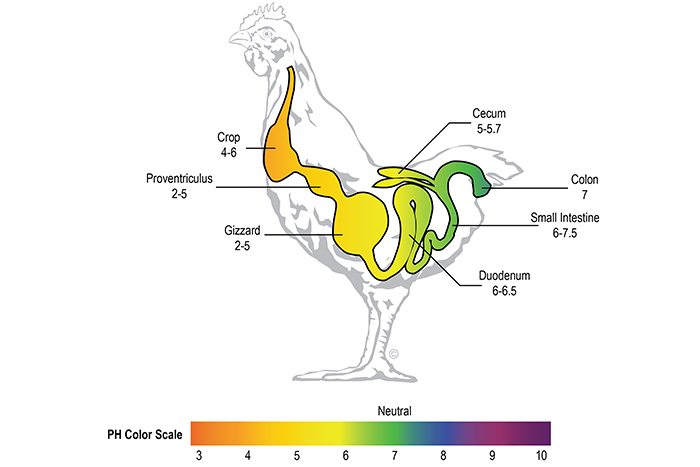
Enzyme additives, such as phytases, amylases, and proteases, improve the digestibility of nutrients in poultry feed, helping birds get more energy from their diet.
Enzymes are important additives used in poultry feed to enhance nutrient utilization, improve feed efficiency, and promote overall poultry health and productivity. They work by breaking down complex nutrients in the feed into simpler forms that are more readily absorbed by the birds. Here are some common enzymes used in poultry feed:
- Phytase: Phytase is an enzyme that breaks down phytic acid, a common antinutrient found in plant-based feed ingredients like grains and oilseeds. Phytase improves the availability of phosphorus and other minerals, contributing to bone development, eggshell quality, and overall growth in poultry.
- Amylase: Amylase enzymes help in the digestion of starch, converting it into simpler sugars that can be absorbed more efficiently. This improves energy utilization and feed conversion efficiency in poultry.
- Protease: Protease enzymes break down complex proteins into smaller peptides and amino acids, which are easier for poultry to digest and absorb. Improved protein digestion leads to better muscle development and overall growth.
- Xylanase: Xylanase enzymes target complex carbohydrates called xylans, which are present in many feed ingredients. By breaking down xylans, xylanase improves the digestibility of feed, particularly in diets that include high-fiber ingredients.
- Cellulase: Cellulase enzymes are used to break down cellulose, a component of plant cell walls. They improve the digestibility of fibrous feed ingredients, enhancing overall nutrient absorption.
- Lipase: Lipase enzymes help break down dietary fats into simpler forms for absorption. This can improve the utilization of dietary lipids and energy.
Benefits of Enzymes in Poultry Feed:
- Improved Nutrient Utilization: Enzymes enhance the digestibility of complex nutrients in feed, allowing poultry to extract more energy, protein, and minerals from their diet.
- Enhanced Feed Efficiency: By improving nutrient utilization, enzymes contribute to better feed conversion ratios, reducing feed wastage and production costs.
- Better Growth and Performance: Poultry fed with enzyme-supplemented diets often exhibit improved growth rates and overall performance.
- Reduced Environmental Impact:Enzymes can help reduce the environmental impact of poultry farming by decreasing the amount of undigested nutrients in manure, which can be an environmental pollutant.
Considerations:
When using enzymes in poultry feed, it's important to consider the following:
- Proper Dosage: The right dosage of enzymes is crucial for optimal results. The appropriate level depends on the specific diet and nutritional requirements of the poultry.
- Quality and Source: High-quality enzymes from reputable sources are essential to ensure effectiveness.
- Feed Formulation: Enzymes must be properly incorporated into feed formulations to achieve the desired results.
- Storage and Handling: Enzymes are sensitive to environmental factors like temperature and humidity, so proper storage and handling are necessary to maintain their activity.
Enzymes play a vital role in modern poultry nutrition by improving the efficiency of nutrient utilization and supporting the growth and well-being of poultry flocks. Poultry nutritionists and veterinarians often work together to formulate diets that incorporate the right enzyme supplements for specific poultry operations.
